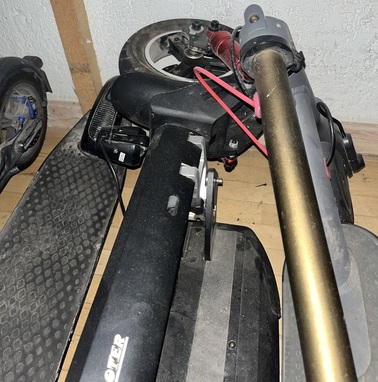An e-scooter works thanks to a battery that supplies power to its various components: motor, controller, lights, etc. When you press the speed knob, the speed controller sends a signal to the battery to give energy to the motor, which then moves the scooter forward.
Most e-scooters use lithium-ion batteries, as they offer a higher capacity and a longer lifetime. The battery includes a battery management system consisting of individual cells and electronics to ensure efficient and safe operation.
The e-scooter's high-capacity batteries allow you to travel faster and further. However, a larger battery reduces the mobility of the scooter, so high-performance e-scooters are heavier because of their large battery.
To understand how much battery capacity you need for your journeys, consider the speed and distance you need to travel.
Types of batteries for electric scooters
Understanding the different types of e-scooter batteries helps you to maintain them properly and replace them when needed. It also helps to understand how the battery affects the performance of the scooter.
Lithium-ion battery
The lithium-ion battery in e-scooters is the most popular on the market. It is also used in many devices such as smartphones, laptops and other smart devices. This battery is lighter, has a higher capacity and lasts longer than other battery types.
However, the disadvantage of using lithium-ion batteries is their sensitivity to extreme temperatures and faster wear and tear. Nevertheless, it is the most popular choice for e-scooter manufacturers and buyers as it maintains its efficiency and durability even after many charging cycles.
Sealed lead acid battery
Some computer scooters and children's electric scooters use lead-acid batteries because they are cheaper than lithium-ion batteries. However, this type of battery is heavier, larger and takes longer to recharge. They also have a lower energy density, which means they deplete energy faster. Nevertheless, they are considered to be reliable batteries for e-scooters.
Nickel battery
Few electric scooters use nickel batteries, but they are the most commonly used rechargeable batteries in electronics and hybrid electric vehicles. They provide a higher energy density and are safer because they have fewer active substances.
However, they are also slow to charge, with charging times of 10-12 hours. They are also sensitive to extreme temperatures. The charging voltage drops quickly when it is too hot or too cold.

